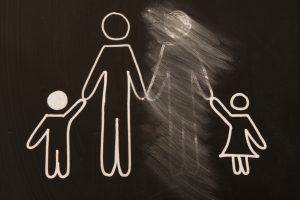Parents have the legal obligation to give support to their children. Failure to provide support is considered a crime known as “criminal non-support of a child”.
Non-Support of a Child in the First Degree. N.Y. Pen. Law § 260.06
A person is guilty of non-support of a child in the first degree when being a parent, guardian or other person:
-
 He/she is legally charged with the care or custody of a child less than sixteen years old and refuses without lawful excuse to provide support; or
He/she is legally charged with the care or custody of a child less than sixteen years old and refuses without lawful excuse to provide support; or - He/she is obligated to make child support payments by an order of child support entered by a court of competent jurisdiction for a child less than eighteen years old and he/she refuses to provide it; and
- He/she has previously been convicted in the preceding five years of a crime defined in section 260.05 of this article or a crime defined by the provisions of section 260.06.
Non-support of a child in the first degree is a class E felony.
Child support is the ongoing obligation for a periodic payment made directly or indirectly by an “obligor” (paying parent or payer) to an “obligee” (receiving party or recipient) for the financial care and support of children of a relationship or a possibly terminated marriage. The obligor is usually a non-custodial parent and the obligee is a custodial parent, caregiver or guardian, or a government agency. In the U.S., there is no gender requirement to child support.
Non-support of a child in the second degree. N.Y. Pen. Law § 260.05
A person is guilty of non-support of a child when being a parent, guardian or other person legally charged with the care or custody of a child less than sixteen years old:
- he/she fails or refuses without lawful excuse to provide support, or
- he/she becomes unable to do so, when, though employable, he/she voluntarily terminates his/her employment, voluntarily reduces his/her earning capacity, or fails to diligently seek employment;
Again, a person is guilty of non-support of a child when being a parent, guardian or other person obligated to make child support payments by an order of child support entered by a court of competent jurisdiction for a child less than eighteen years old,
- he/she knowingly fails or refuses without lawful excuse to provide support, or
- he/she becomes unable to do so, when, though employable, he/she voluntarily terminates his/her employment, voluntarily reduces his/her earning capacity, or fails to diligently seek employment.
Non-support of a child in the second degree is a class A misdemeanor.
Every state in the United States has a child support enforcement (CSE) program. In New York State, child support enforcement services are provided by Child Support Enforcement Units (CSEU) and Support Collection Units (SCU) in every county and in New York City.
The CSE program began in 1975, when Congress passed Title IV-D of the Social Security Act. Title IV-D required every state to:
- Establish and maintain statewide child support enforcement laws,
- Provide procedures to establish paternity and to obtain court orders for child support,
- Collect and distribute child support payments, and
- Enforce child support orders when payments are not made.
A person who has physical custody of the children for more than half of the time can usually get child support from the other parent. Child support is ordered by the Family Court, or in the Supreme Court as part of a divorce case.
 The court decides how much child support should be paid, looking at how much the non-custodial parent gains. The court subtracts expenses, such as social security taxes and child support for other children. This number is the total gross income minus specific deductions, called “adjusted gross income”. The number is multiplied by a percentage, depending on the number of children, as follows: 17% one child, 25% two children, 29% three children, 31% four children, 35%, five or more children.
The court decides how much child support should be paid, looking at how much the non-custodial parent gains. The court subtracts expenses, such as social security taxes and child support for other children. This number is the total gross income minus specific deductions, called “adjusted gross income”. The number is multiplied by a percentage, depending on the number of children, as follows: 17% one child, 25% two children, 29% three children, 31% four children, 35%, five or more children.
If you’re facing criminal charges of Non-Support of a Child, you should contact an experienced criminal defense lawyer. Non-Support of a Child is a serious crimes under New York law and the seriousness is reflected in the penalties, which includes jail time.
